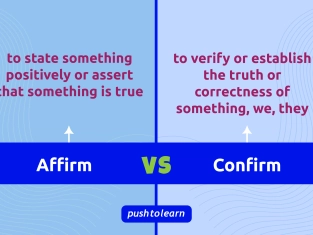by PushtoLearn
Affect vs Effect
Table of Contents
Affect vs Effect - Exercise
This exercise focuses on Affect vs Effect
The Key Difference Between Affect and Effect
-
Affect is usually a verb. It means to influence or to change something.
-
Effect is usually a noun. It means the result or the outcome of a change.

Detailed Explanation
1. Affect (Verb)
Affect describes the action of making a change or influencing something.
Examples:
-
The rain affected our plans. (The rain changed our plans.)
-
Loud music can affect your concentration.
Common Sentence Structure:
-
Subject + affect + object
-
Example: Stress affects your health.
2. Effect (Noun)
Effect refers to the result or outcome of an action.
Examples:
-
The medicine had a positive effect on my health.
-
His words had a powerful effect on the audience.
Common Sentence Structure:
-
Article (a/an/the) + effect + on something
-
Example: This policy will have an effect on the economy.
Quick Trick to Remember
-
Affect = Action (Verb)
-
Effect = End Result (Noun)
Common Errors and How to Fix Them
|
Error |
Correction |
Explanation |
|
The new rules will effect everyone. |
The new rules will affect everyone. |
Use affect for the verb form. |
|
The change didn’t have any affect. |
The change didn’t have any effect. |
Use effect for the noun form. |
|
His mood effects his work. |
His mood affects his work. |
Use affects (verb form) in the present tense. |
Everyday Use of Affect and Effect
|
Situation |
Example Using Affect |
Example Using Effect |
|
Weather |
The cold weather affected her mood. |
The effect of the cold was visible. |
|
Health |
Smoking affects your lungs. |
The effect of smoking is harmful. |
|
Work |
Stress can affect productivity. |
Lack of sleep has a negative effect on work. |
Vocabulary may surprise you. Words can sound similar, but in fact have different meanings. We have prepared lessons with confusing language pairs for you to avoid mistakes: Creampie or Cream Pie, Incoming vs Upcoming, Then vs Than, Affirm vs Confirm, In Process vs In Progress, Fiend vs Feen, Elder vs Odler, Food vs Meal vs Dish.
FAQ
Can “effect” be a verb?
Yes, but it’s rare. As a verb, effect means “to bring about” or “to cause.” Example: "The new CEO will effect major changes."
Can “affect” be a noun?
Yes, but it’s uncommon. In psychology, affect refers to an emotional state or expression. Example: "She showed no affect during the interview."
How do I know which one to use?
Ask yourself:
-
Is it an action? Use affect (verb).
-
Is it a result? Use effect (noun).
What’s the past tense of “affect”?
The past tense of affect is affected. Example: "The delay affected the schedule."
Are there other words that work like “affect” and “effect”?
Yes! Think of:
-
Affect = influence, change
-
Effect = result, consequence

